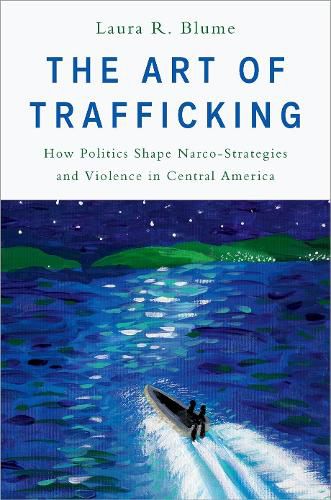Readings Newsletter
Become a Readings Member to make your shopping experience even easier.
Sign in or sign up for free!
You’re not far away from qualifying for FREE standard shipping within Australia
You’ve qualified for FREE standard shipping within Australia
The cart is loading…






How and why do drug traffickers adapt their operational strategies based on political and community dynamics, and, in turn, how do these different narco-strategies impact violence? To address these questions, this book draws on several years of immersive, ethnographic fieldwork in drug trafficking hotspots along the Caribbean coast of Honduras, Nicaragua, and Costa Rica. In addition to extensive use of participant observation methods, the author has conducted 300 informal interviews, more than 75 of which were with participants in the illegal narcotics trade ranging from local marijuana and crack dealers to international cocaine traffickers.The book presents a theory of how corruption and political competition determine traffickers' main strategies (collusion, cooptation, or evasion) as well as how traffickers may cultivate local community support, especially in their native communities. It then elaborates on how these various narco-strategies and differences in community support influence traffickers use of violence. The author illustrates with ethnographic evidence, as well as original datasets on massacres and violence against public figures, how cooptation strategies in Honduras and evasion strategies in Costa Rica both increase the risk of violence, especially when there is zero-sum criminal competition, yet with significant differences in terms of the targets of violence under evasion versus cooptation strategies. In contrast, collusion strategies in Nicaragua eliminate most trafficking-related violence; yet the same authoritarian system that de facto manages the drug trade and reduces narco-violence contributes to violent political repression in Nicaragua. Ultimately, The Art of Trafficking is a powerful condemnation of the U.S.-led War on Drugs and makes a strong case for urgent policy changes, both in the U.S. as well as in Central America.
$9.00 standard shipping within Australia
FREE standard shipping within Australia for orders over $100.00
Express & International shipping calculated at checkout
How and why do drug traffickers adapt their operational strategies based on political and community dynamics, and, in turn, how do these different narco-strategies impact violence? To address these questions, this book draws on several years of immersive, ethnographic fieldwork in drug trafficking hotspots along the Caribbean coast of Honduras, Nicaragua, and Costa Rica. In addition to extensive use of participant observation methods, the author has conducted 300 informal interviews, more than 75 of which were with participants in the illegal narcotics trade ranging from local marijuana and crack dealers to international cocaine traffickers.The book presents a theory of how corruption and political competition determine traffickers' main strategies (collusion, cooptation, or evasion) as well as how traffickers may cultivate local community support, especially in their native communities. It then elaborates on how these various narco-strategies and differences in community support influence traffickers use of violence. The author illustrates with ethnographic evidence, as well as original datasets on massacres and violence against public figures, how cooptation strategies in Honduras and evasion strategies in Costa Rica both increase the risk of violence, especially when there is zero-sum criminal competition, yet with significant differences in terms of the targets of violence under evasion versus cooptation strategies. In contrast, collusion strategies in Nicaragua eliminate most trafficking-related violence; yet the same authoritarian system that de facto manages the drug trade and reduces narco-violence contributes to violent political repression in Nicaragua. Ultimately, The Art of Trafficking is a powerful condemnation of the U.S.-led War on Drugs and makes a strong case for urgent policy changes, both in the U.S. as well as in Central America.